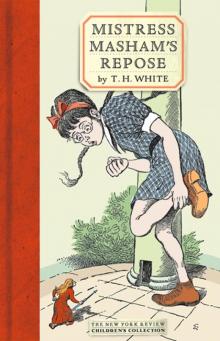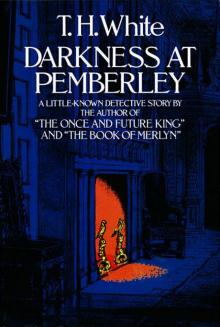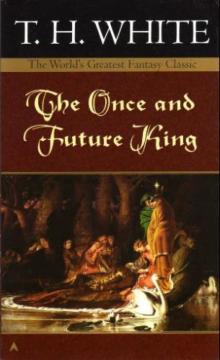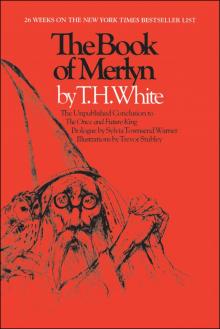- Home
- T. H. White
The Once and Future King (#1-4) Page 37
The Once and Future King (#1-4) Read online
Page 37
Three years may seem a long time for a boy to spend in one room, if he only goes out of it to eat and sleep and to practise tilting in the field. It is even difficult to imagine a boy who would do it, unless you realize from the start that Lancelot was not romantic and debonair. Tennyson and the Pre—Raphaelites would have found it difficult to recognize this rather sullen and unsatisfactory child, with the ugly face, who did not disclose to anybody that he was living on dreams and prayers. They might have wondered what store of ferocity he had against himself, that could set him to break his own body so young. They might have wondered why he was so strange.
To begin with, he had to spend the weary months charging against Uncle Dap, with a blunt spear under his arm. Uncle Dap, armed cap—à—pied, would sit on a stool – and Lancelot, with the morne—headed spear, would charge and charge against him, learning the best lodges on armour for a point. Then there were lonely hours with poises, with many other hours out of doors – before he was even allowed to touch real arms – in which he learned various kinds of throwing, casting with the sling—stick or the casting spear, and tossing the bar. After that, after a year of toil, there was his promotion to the pel—quintain. It was a stake driven upright in the ground, and he had to fight against it with sword and shield – rather like shadow—boxing, or using a punch—ball. He had to use arms for this exercise which weighed twice as much as the ordinary sword and shield. Sixty pounds was considered a good weight for the arms used on the pel—quintain – so that, when he did come at length to the usual weapons, he would wield them featly. They would seem light by comparison. The final stage of breaking to the cricket standard was by mock combats. In these at last, and after all the bitter setbacks of discipline, he was allowed to fight battles which were nearly real ones, against his brother and cousins. The combats were held under strict rules. They might begin with a cast of the spear blunted, followed by seven strokes with the sword, point and edge rebated, ‘without close, or griping one another with the handles, upon paine of punishment as the judges for the time being shall thinke requisite.’ It was not lawful in these matches to foin – that is, to make a thrust of the point. Finally there was swashbuckling. The now vigorous boy might go at his companions harum—scarum, with sword and buckler.
If you have been down in one of the old—fashioned diving suits which used to be standard in the Royal Navy before frogmen and free diving came along, you will know why divers move slowly. A diver has forty pounds of lead on each foot and two plaques of lead – each weighing fifty pounds – one on his back and one on his chest. These are apart from the weight of the suit and the helmet. Except when he is in the sea, he weighs twice as much as a man. When he has to step over a rope or an air—tube on deck, it is hard work – like climbing a wall. If you push him from in front, the weight behind him tends to take over, so that he might fall backwards. The same thing happens vice versa. Practised divers become adept at dealing with these handicaps, and can hoist those forty pound feet up and down the ship’s ladder fairly nimbly – but an amateur half kills himself with the mere toil of movement. Lancelot, like the diver, had to learn to be nimble against the force of gravity.
Knights—in—armour were like divers in more ways than one.
Apart from their helmets and encumbrances and the difficulty of breathing, they had to be dressed in their suits by kind and careful assistants. They had to rely on these assistants to do it properly. A diver puts his life in the hands of the ratings who are dressing him. These young men, like pages or squires, mother him with great tenderness and concentration and with a sort of protective respect. They always address him by his title, not by his name. They say, ‘Sit down, diver,’ or ‘Now the left foot, diver,’ or ‘Diver Two, can you hear me on the inter—com?’
It is good to put your life in other people’s hands.
Three years of it. The other boys did not worry, for they had other things to think about – but for the ugly one it was the whole of an obscure and mystic life. He had to perfect himself for Arthur as somebody who was good at games, and he had to think about the theories of chivalry even when he was in bed at night. He had to teach himself to possess a sound opinion on hundreds of disputed points – on the proper length of weapons, or the cut of a mantling, or the articulation of a pauldron, or whether cedarwood was better than ash for spears, as Chaucer seems to have believed.
Here is a short example of the problems of chivalry, which he thought about in his early times. There was a knight once called Reynaud de Roy, who had a tilting match with another one called John de Holland. Reynaud purposely fastened his tilting helm – the huge straw—padded drum which sometimes fitted over the helmet proper – so that it was loose. When John of Holland’s spear struck it, it simply fell off. This meant that the helm came off Reynaud, instead of Reynaud coming off his horse. An effective trick, but a dangerous one – the whole of chivalry argued about it for a long time, some saying that it was unsporting, some that it was fair but too risky, and some that it was a good idea.
Three years of discipline made Lancelot not a merry heart and a capacity for singing tirra—lirra. Out of a lifetime which at his age must have seemed to stretch little more than a week ahead, he gave thirty—six months to another man’s idea because he was in love with it. He supported himself meanwhile on daydreams. He wanted to be the best knight in the world, so that Arthur would love him in return, and he wanted one other thing which was still possible in those days. He wanted, through his purity and excellence, to be able to perform some ordinary miracle – to heal a blind man or something like that, for instance.
Chapter III
There was a feature about the great families which centred round the doom of Arthur. All three had a resident genius of the family, half—way between a tutor and a confidant, who affected the character of the children in each. At Sir Ector’s castle there had been Merlyn, who was the main influence in Arthur’s life. In lonely and distant Lothian there had been St Toirdealbhach, whose warlike philosophy must have had something to do with the clannishness of Gawaine and his brothers. In King Ban’s castle there was an uncle of Lancelot’s, whose name was Gwenbors. Actually he was the old man we have met, known to everybody as Uncle Dap, but his given name was Gwenbors. In those days you generally named your children in the same way as we name foxhounds and foals today. If you happened to be Queen Morgause and had four children, you put a G in all their names (Gawaine, Agravaine, Gaheris, and Gareth) – and, naturally if your brothers happened to be called Ban and Bors, you were doomed to be called Gwenbors yourself. It made it easier to remember who you were.
Uncle Dap was the only one in the family who took Lancelot seriously, and Lancelot was the one who was serious about Uncle Dap. It was easy not to be serious about the old fellow, for he was that peculiar creation which ignorant people laugh at – a genuine maestro. His branch of learning was chivalry. There was not a piece of armour proofed in Europe but what Uncle Dap had a theory about it. He was furious with the new Gothic style, with its ridges and scallop—patterns and fluting. He considered it ridiculous to wear armour like the ropework on a Nelson sideboard, for it was obvious that every groove would be liable to hold a point. The whole object of good armour, he said, was to throw the point off – and, when he thought of the people in Germany making their horrible furrows, he nearly went frantic. There was nothing in Heraldry which he did not know. If anybody committed any of the grosser errors – such as putting metal on metal or colour on colour – he became electrified with passion. His long white moustaches quivered at their tips like antennae, the ends of his fingers came together in gestures of the wildest passion, and he waved his arms and jumped up and down and wagged his eyebrows and almost fizzed. Nobody can be a maestro without being subject to these excitements, so Lancelot seldom minded when he got his face slapped in a mêlée about shields cut à bouche or about whether it was a good idea to have a guige on your shield or not. Sometimes Uncle Dap was tantalized into beating him, but he bore t
hat also. In those days they did.
One reason for not minding Uncle Dap’s transports was that everything the boy wanted could be learned from him. He was not only a distinguished clerk and authority on his own subjects – he was also one of the finest swordsmen in France. It was for this, really, that the boy had attached himself. It was in order to rase and trace and foin under the brutal tuition of genius – in order to hold out a heavy sword at arm’s length in a lunge until he felt he would split in half – only to have Uncle Dap catch hold of his point and pull him into a crueller stretch.
Ever since he could remember, there had been the excited man with the eyes of blue steel, jumping up and down, and snapping his fingers, and shouting out as if life itself depended on it: ‘Doublez! Dédoublez! Dégagez! Un! Deux!’
One fine day in late summer, Lancelot was sitting in the Armoury with his uncle. In the big room there was a lot of dust dancing in the sunbeams, dust which they had themselves been stirring up a moment before, and round the walls there were the ranks of polished armour, and the racks of spears, and helms and morions hanging on pegs. There were misericordes and harness and the various banners and pennoncels, blazoned with the Ban chargers. The two fencers had sat down to rest after an exciting bout, and Uncle Dap was blown. Lancelot was eighteen now. He was a better fencer than his maestro – though Uncle Dap would not admit it, and his pupil tactfully pretended that he was not.
A page came in while they were still panting, and told him that he was wanted by his mother.
‘Why?’
The page said that a gentleman had arrived who wanted to see him, and the Queen had said that he was to come at once.
Queen Elaine was sitting in the solar, where she had been doing tapestry work, and her two guests were sitting on either side of her. She was not the Elaine who had been one of the Cornwall sisters. It was a popular name in those days and several women in the Morte d’Arthur had it, particularly as some of its manuscript sources have got mixed up. The three grown—ups at the long table looked like a row of examiners in the dim room. One of the guests was an elderly gentleman with a white beard and pointed hat, and the other was a handsome minx with an olive complexion and plucked eyebrows. They all three looked at Lancelot, and the old gentleman spoke first.
‘Hum!’
They waited.
‘You called him Galahad,’ said the old gentleman.
‘His first name was Galahad,’ he added, ‘and now he is Lancelot, since he was confirmed.’
‘However did you know?’
‘It can’t be helped,’ said Merlyn. ‘It is one of the things one does know, and there’s an end on’t. Now, let me see, what are the other things I was supposed to tell you?’
The young lady with the plucked eyebrows put her hand before her mouth and yawned gracefully, like a cat.
‘He will get the hope of his heart thirty years from now, and he will be the best knight in the world.’
‘Shall I live to see it?’ asked Queen Elaine.
Merlyn scratched his head, gave it a bump on the top with his knuckles, and replied:
‘Yes.’
‘Well,’ said the Queen, ‘it is all very wonderful, I must say. Do you hear that, Lance? You are to be the best knight in the world!’
The boy asked: ‘Have you come from the court of King Arthur?’
‘Yes.’
‘Is everything well?’
‘Yes. He sends you his love.’
‘Is the King happy?’
‘Very happy. Guenever sent her love too.’
‘Who is Guenever?’
‘Good gracious!’ exclaimed the magician. ‘Didn’t you know about that? No, of course not. I have been getting bejingled in my brains.’
Here he glanced at the beautiful lady, as if she might be responsible for the jingling – which she was. She was Nimue, and he had fallen in love with her at last.
‘Guenever,’ said Nimue, ‘is Arthur’s new queen. They have been married for some time.’
‘Her father is King Leodegrance,’ explained Merlyn. ‘He gave Arthur a present of a round table when they were married, and a hundred knights to go with it. There is room at the table for a hundred and fifty.’
Lancelot said: ‘Oh!’
‘The King meant to tell you,’ said Merlyn. ‘Perhaps the messenger got drowned on the way over. There may have been a storm. He really did mean to tell you.’
‘Oh,’ said the boy, for the second time.
Merlyn began to talk quickly, because he saw that it was a difficult situation. From Lancelot’s face he could not tell whether he was hurt or whether it was like that always.
‘He has only managed to fill in twenty—nine of the seats so far,’ he said. ‘There is room for twenty—one more. Plenty of room. All the knights’ names are written on them in gold.’
There was a pause, during which nobody knew what to say. Then Lancelot cleared his throat.
‘There was a boy,’ he said, ‘when I was in England. His name was Gawaine. Has he been made one of the knights of the table?’
Merlyn looked guilty, and nodded his head.
‘He was created on the day Arthur was married.’ I see.
There was another long pause.
‘This lady,’ said Merlyn, feeling that he had better fill in the silence, ‘is called Nimue. I am in love with her. We are having a sort of honeymoon together – only it is a magical one – and now we shall have to be off to Cornwall. I am sorry we could not visit you for longer.’
‘My dear Merlyn,’ exclaimed the Queen, ‘but surely you will stay the night?’
‘No, no. Thank you. Thank you very much. We are in a hurry just now.’
‘You will have a glass of something before you leave?’
‘No, thank you. It is very kind of you, but really, we must be off. We have some magic to attend to in Cornwall.’
‘Such a short visit –’ began the Queen.
Merlyn cut her short by standing up and taking Nimue’s hand in his.
‘Good—bye now,’ he said with determination – and in a couple of spins they were both gone.
Their bodies were gone, but the magician’s voice remained in the air.
‘That’s that,’ they could hear him saying in a relieved tone. ‘Now then, my angel, what about that place I was telling you of in Cornwall, the one with the magical cave in it?’
Lancelot went back to Uncle Dap in the Armoury, with slow steps. He stood in front of his uncle, and bit his lip.
‘I am going to England,’ he said.
Uncle Dap looked at him in amazement, but said nothing.
‘I shall start this evening.’
‘It seems sudden,’ said Uncle Dap. ‘Your mother does not usually make up her mind so quickly.’
‘My mother does not know.’
‘Do you mean that you are going to run away?’
‘If I told my mother and father, there would only be a fuss,’ he said. ‘It is not that I am running away. I shall come back again. But I must go to England as quick as I can.’
‘Do you expect me to tell your mother?’
‘Yes, I do.’
Uncle Dap gnawed the ends of his moustache, and wrung his hands.
‘If they get to know that I could have prevented it,’ he said, ‘Ban will cut off my head.’
‘They will not know,’ said the boy indifferently, and he went away to arrange about his packing.

 The Once and Future King (#1-4)
The Once and Future King (#1-4) Once & Future King 05 - The Book of Merlyn
Once & Future King 05 - The Book of Merlyn Mistress Masham's Repose
Mistress Masham's Repose Darkness at Pemberley
Darkness at Pemberley The Once and Future King
The Once and Future King The Book of Merlyn
The Book of Merlyn Candle in the Wind
Candle in the Wind